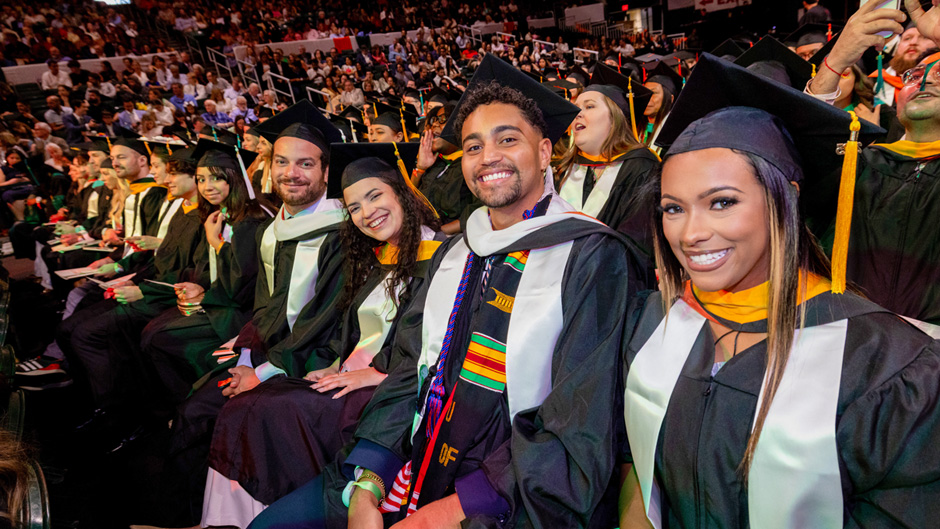Life abounds with challenges and uncertainties today much as it did in the mid-1970s when he earned his three University of Miami degrees, James A. Kushlan, author, biologist, educator, and conservationist, told students at the first graduate degree ceremony on Thursday.
Kushlan admitted that he was “terrified” as a new degree holder to face the woes of his day—a war, a draft, economic chaos, stock market crash, inflation, professional unemployment, and long lines for gasoline—yet from his own experience, he reassured the graduates. Not only do many of those challenges hold unexpected opportunities and pathways, but the skills that they have gleaned from their University education will see them through.
“You’ve learned to be critical, creative, to recognize nonsense, to innovate, to collaborate, and to adapt. You’ve learned how to swagger like a Cane, and you’ve learned how to learn—those skills and experiences will stay with you forever,” Kushlan said.
At the afternoon ceremony, Susan Mullane, one of the first female divers who helped build the University of Miami’s nascent swimming and diving program in the 1970s, regaled master’s and doctoral graduates with some of her memories as a triple Cane. After receiving one of the first female athletic scholarships to dive in Coral Gables, Mullane left her hometown of Lexington, Kentucky, for what was then “Suntan U,” but watched—and helped—it rise to become a world-class research institution, which is now part of the elite Association of American Universities.

“Our logo is recognized all over the world, and not only for athletics, but for our outstanding academic stature,” she said. “Our great University of Miami has prepared you well. Never let this connection go and give back in whatever ways you can.”
In the morning, Kushlan urged graduates that when the inevitable challenges do arise, embrace them and meet them with your research and scholarship, professional engagement and advocacy.
View photos and videos from commencement ceremonies from our multimedia coverage.
Read student profiles and find commencement ceremony info in our special report.
“We need formally educated people with knowledge, skills, confidence, and boldness. People to find new ways of doing things. People like you,” Kushlan told students graduating from the Graduate School, College of Arts and Sciences, College of Engineering, Rosenstiel School of Marine, Atmospheric, and Earth Science, Leonard M. Miller School of Medicine, and School of Nursing and Health Studies.
Kushlan grew up in Miami and developed a fascination with the birds, alligators, manatees, and other exotic creatures that filled the South Florida waterways. That fascination defined his life’s work. He was the first in his family to graduate college and graduate school, earning a master’s and doctoral degree in biological sciences.
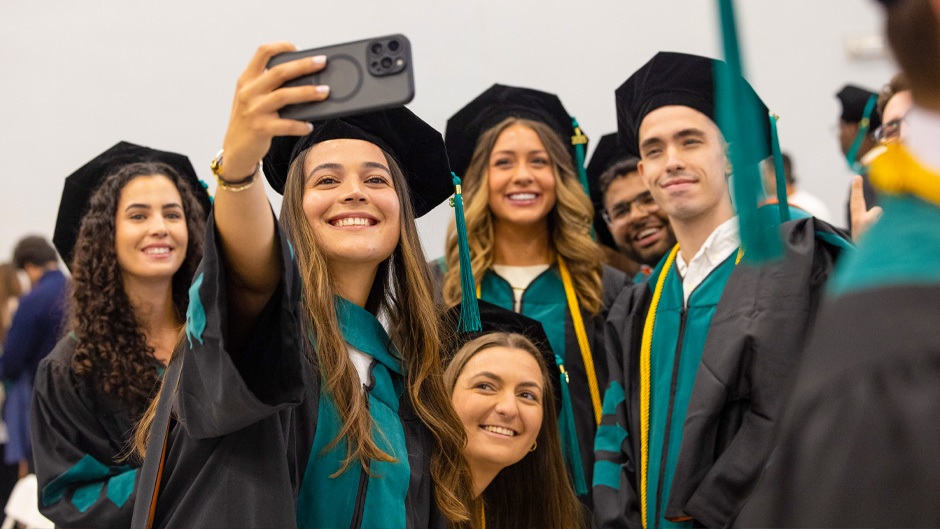
He went on to author 12 books and more than 270 technical articles, taught at multiple universities—including his alma mater—founded several conservation organizations, and helped shape conservation policy and research at national and global levels.
Scholarships made it happen, he said.
“I suspect philanthropy has helped you or your friends. Please, remember that and, when it’s your turn, give back,” added Kushlan, who has endowed a professorship and a graduate-student research fund at the University and established several global grant programs for waterbird conservation.
Kushlan recognized that as a baby boomer who lived in the dominating country of the post-World War II world, he enjoyed “the greatest ever prosperity and opportunities for advancement through education.”
Though his generation started the environmental movement, protested war, and boasted that it would change the world, the boomers’ report card for the 40 years that they’ve been in charge has been a “massive failure,” Kushlan said.
Since he was born, Kushlan noted that over 52 million people have died in war, carbon dioxide emissions are six times higher, the world’s population climbed from 2.5 to 8 billion people, and sea level off Miami rose eight inches.
“I’m afraid we did change the world. We are literally wrecking it,” Kushlan said. “I’ve been looking for a way to apologize. For me and on behalf of my generation, I’m sorry for what we’ve done. Please, please, please, you do better.”
Kushlan reminded students that to do better they should make wise choices, especially out of concern for the planet’s well-being.
“Each of us can make a difference through homes you’ll choose to live in, on land you’ll choose to own, even landscaping you’ll choose; where you choose to get your electricity; policies you’ll advocate; causes and organizations you’ll support,” he said.
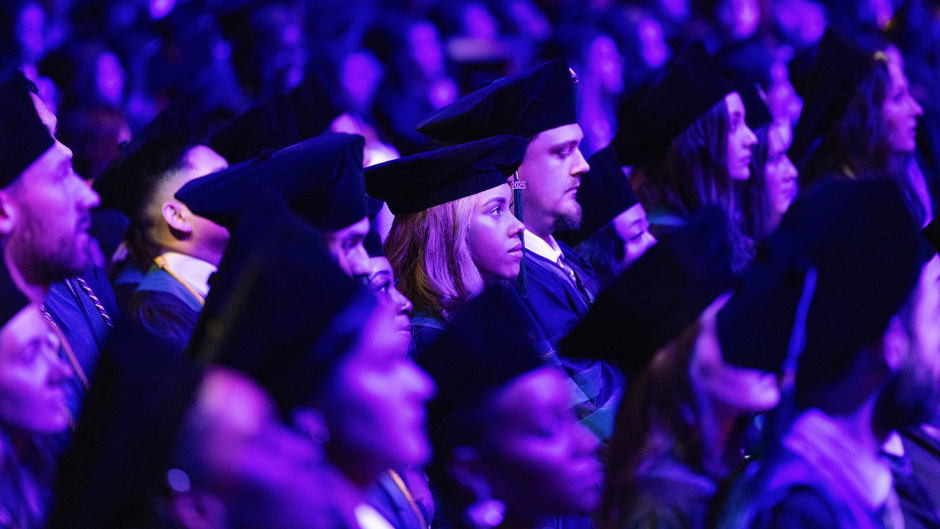
“Each generation inherits the charge. Not just Everglades restoration, but any natural area we can,” he added. “We each can help protect and restore nature, little by little, bit by bit.”
For the ceremony on Thursday, just a month following the University’s 100-year anniversary of its founding, Kushlan said there was much in the school’s history to celebrate.
“And even more—today we celebrate what you’ve learned and your experiences,” Kushlan said. “We also celebrate embracing uncertainties, challenges, and unexpected opportunities.”
The afternoon speaker, Mullane, earned a master’s in education and a doctoral degree in higher education and sport administration, while working as an administrator in student affairs and later in UM Athletics. She went on to found and direct the undergraduate Sport Administration Program in the School of Education and Human Development. Mullane is retiring this year after 43 years of working and teaching at the University, spending much of her research time focused on ethics in sports.
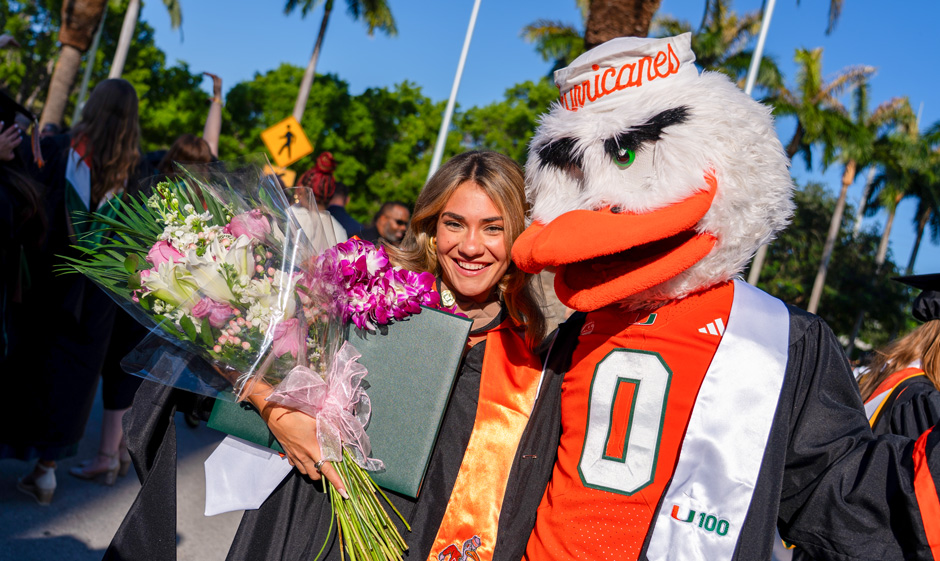
One of Mullane’s oldest friends, made early on at the University, was Linda Dunn Brown, who passed away two weeks ago. Dunn Brown was the granddaughter of the U’s first president, Bowman Foster Ashe. She was also the daughter of Eddie Dunn, a Hurricanes football player, coach, and University trustee, who came to watch Mullane’s swimming and diving competitions. The pioneering women’s team eventually won a national championship in 1975 and again in 1976.
“Spending time with that family should give you a sense of why I fell in love with the U and have had this 50-year love affair with my alma mater,” she said.
Mullane offered some leadership advice, another area of her research. She told graduates to never stop learning; expect the unexpected; serve as a mentor to others by sharing what you have learned; take the opportunity to venture out of your comfort zone; listen to others before speaking; and remember that you are always being observed.
“The value of accountability in my opinion is so important,” she told graduates. “Accountability cannot be treated like a baton—you can’t simply hand it off. But, if you are going to hand it off, make sure it gets where it’s going. That’s your responsibility.”
University President Joseph Echevarria also offered some words of wisdom for the graduates and told them he wants the U to remain a strong community that elevates all of its Hurricanes.
“Some places have faltered in the midst of uncertainty, but not here,” said Echevarria, who is also an alumnus. “Thanks to all of you, the U remains a place where we value excellence and meritocracy, and the things we accomplish together are made better by our different life experiences.”
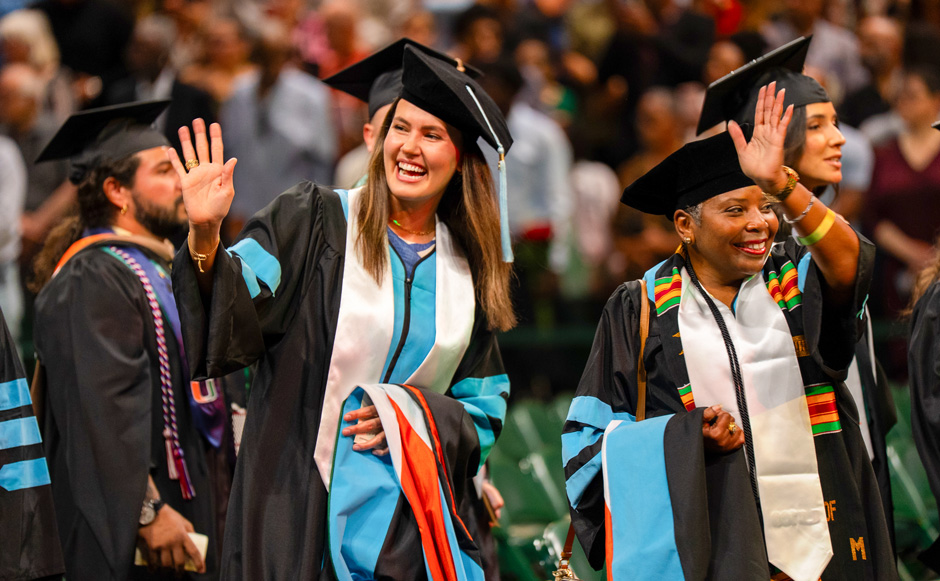
Students and their families reconnected outside the Watsco Center after both ceremonies Thursday.
PennShelia Griffin-Brooker’s family came all the way from her hometown of Yemassee, South Carolina, to celebrate her graduation and donned matching shirts to honor her. Growing up in rural South Carolina, moving to Miami for three years was a major change for Griffin-Brooker, but she enjoyed honing her craft and earned her doctoral degree in physical therapy. Griffin-Brooker also made friends she now considers family, some of the 62 others graduating with her in the program, which is offered at the Miller School of Medicine.
She will start work as a physical therapist in Charlotte, North Carolina, at an outpatient orthopedic clinic this summer.
“I like seeing the rehab process from start to finish,” said Griffin-Brooker, a former varsity athlete in track, basketball and volleyball. “When people get injured, they are at their most vulnerable and they need someone’s encouragement. I like to be that someone.”
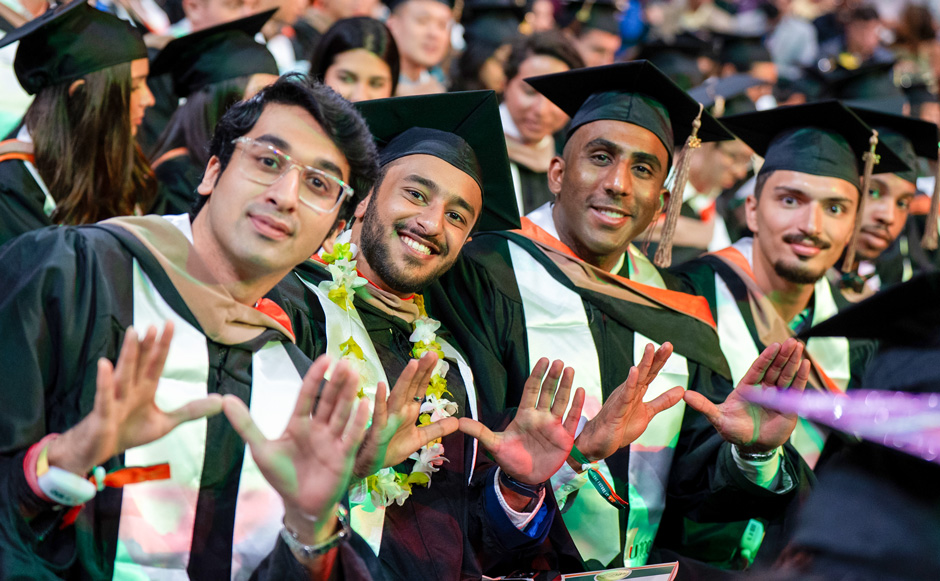
For Amr Elhendawy, earning his master’s degree in construction management is proof that the passage of time doesn’t douse the flame of wanting to continuously learn.
Four years had passed since the last time he sat in a college classroom, a time during which he put his undergraduate degree in architecture to good use by working for a design firm in Egypt. “So, the biggest challenge I faced in graduate school was getting my feet wet again in the rigors of academic life,” he said Thursday. “Today is a big moment for me—I proved to myself that I could do it.”
Ever since she sustained a serious injury while playing volleyball as a 13-year-old, Briana Sutherland knew she wanted to help heal the injured and aid the disabled in regaining and maintaining function. “Today I’m taking a giant step toward realizing that dream,” she said at Thursday’s 10 a.m. graduate degree ceremony, where she received her Doctor of Physical Therapy diploma. “Now, it’s on to an outpatient clinic where I really hope to make a difference.”
For Sutherland's close friend and classmate, Olivia Sengstock, Thursday was “the start of something new,” she said. With her newly minted D.P.T. degree, she is off to Pensacola, Florida, to work in a sports rehabilitation clinic, but not before setting an example for her younger sister and brother.
“I feel like I’m the perfect role model for them,” Sengstock said. “They both saw me graduate today and plan to follow in my footsteps.”
— Robert C. Jones Jr. contributed to this report.
